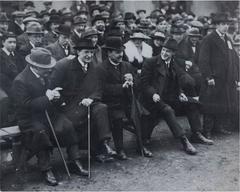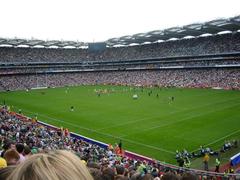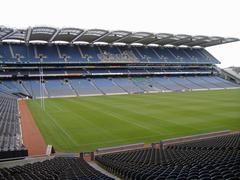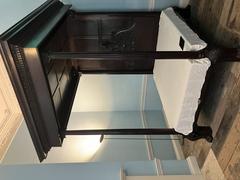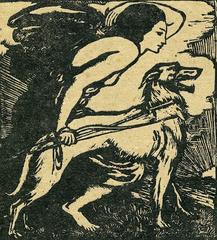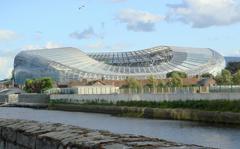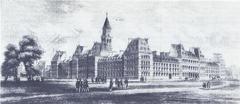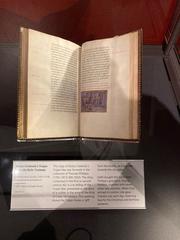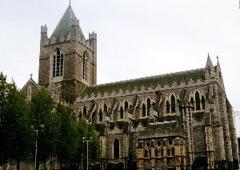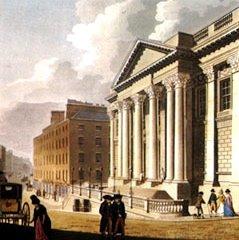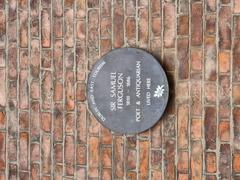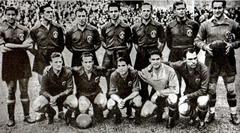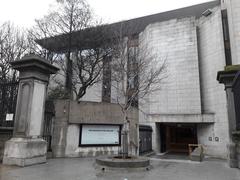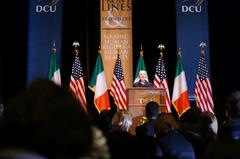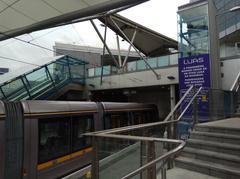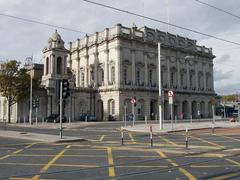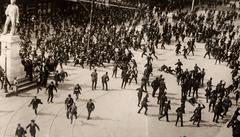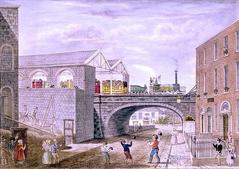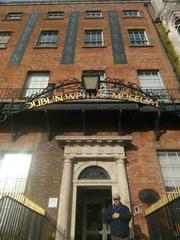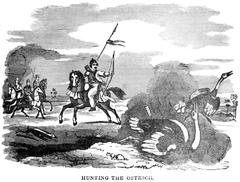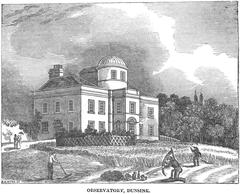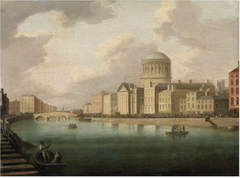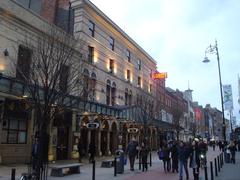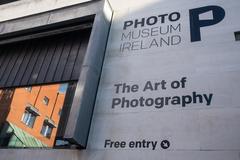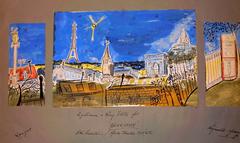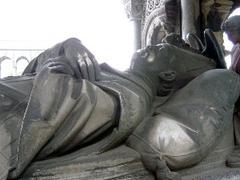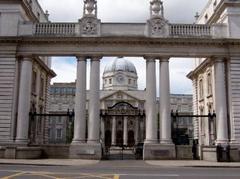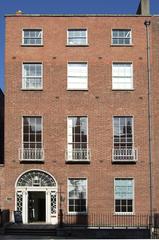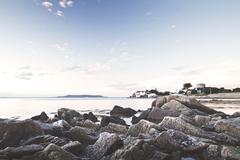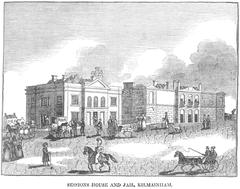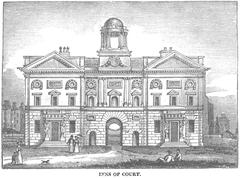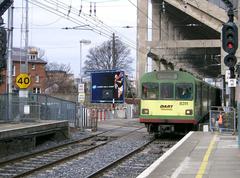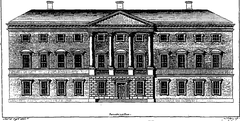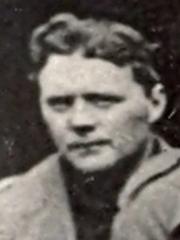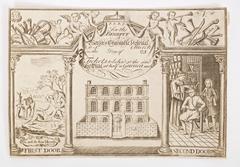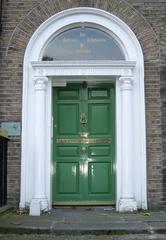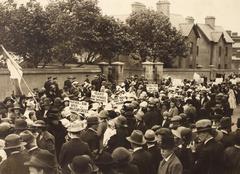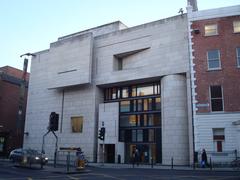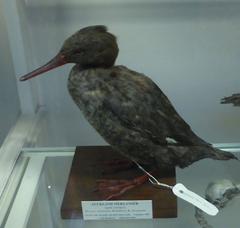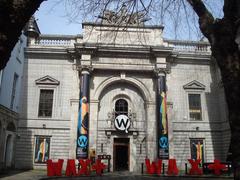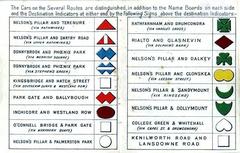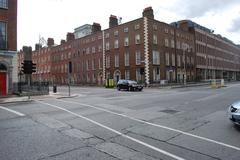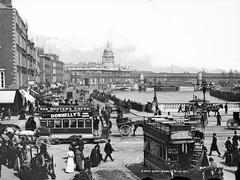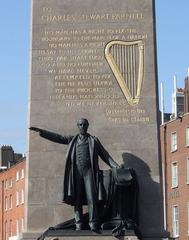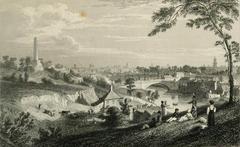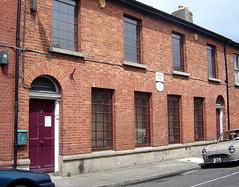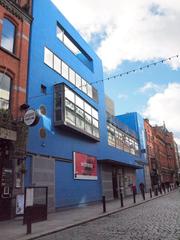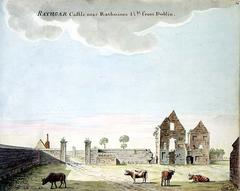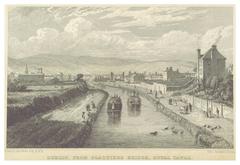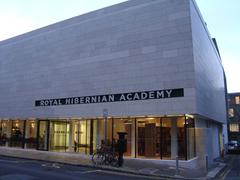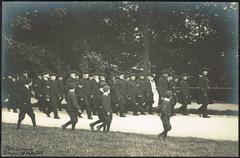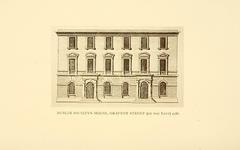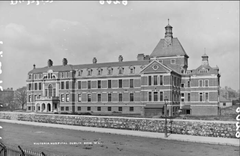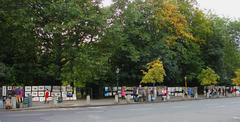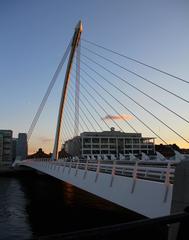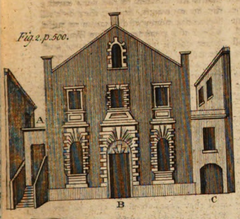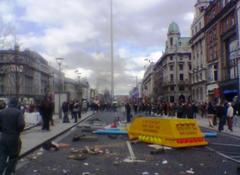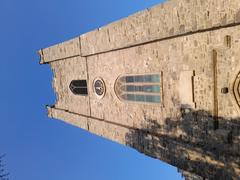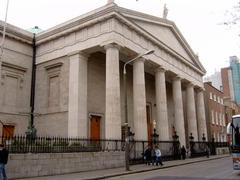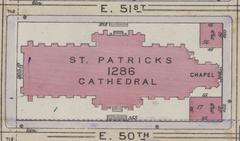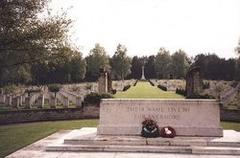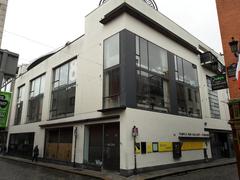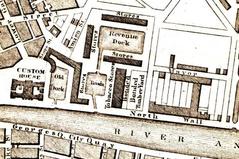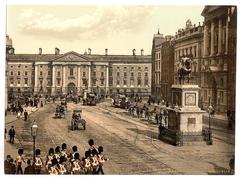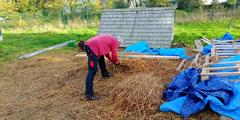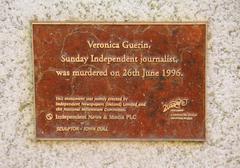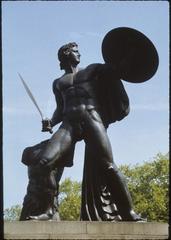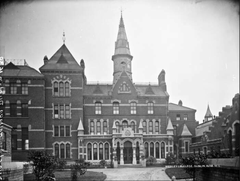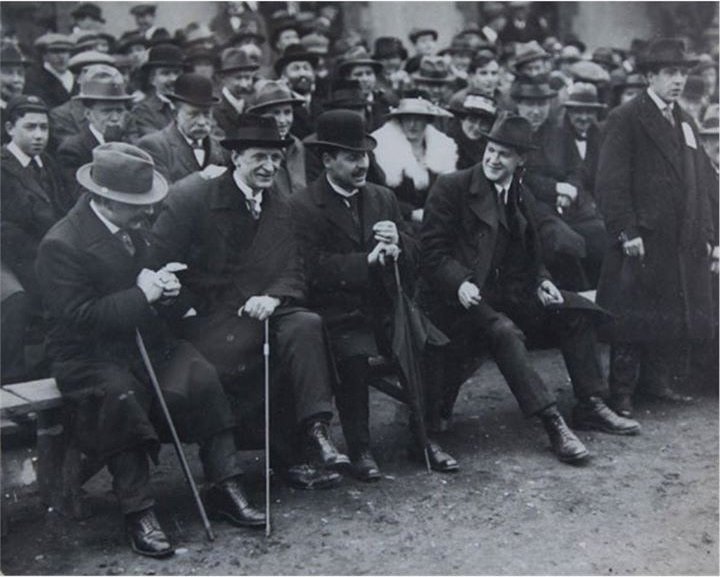
Visiting Croke Park, Dublin: Complete Guide to Tickets, Hours, and Top Attractions
Date: 14/06/2025
Introduction to Croke Park
Croke Park, located in the heart of Dublin, stands as a powerful symbol of Irish cultural and sporting heritage. As the third-largest stadium in Europe, with a seating capacity exceeding 82,000, it is the headquarters of the Gaelic Athletic Association (GAA) and the main venue for Ireland’s premier Gaelic games: hurling and Gaelic football. Beyond its sporting significance, Croke Park has played a pivotal role in Ireland’s history, from its association with the 1920 Bloody Sunday tragedy to hosting concerts, international sporting events, and major cultural gatherings. A visit to Croke Park is not just about sport—it’s a journey through Irish identity, innovation, and community spirit (Croke Park Official, Wikipedia, Dublin Places to Visit).
Table of Contents
- History and Origins
- Evolution and Expansion
- Key Historical Events
- Architectural and Cultural Features
- Croke Park’s Role in Irish Identity
- Visitor Information: Tickets, Hours, Accessibility
- Stadium Tours and Experiences
- The GAA Museum
- Ericsson Skyline Tour
- Match Day Experience
- Visitor Facilities and Accessibility
- Nearby Attractions and Accommodation
- Sustainability and Awards
- FAQs
- Summary and Visitor Tips
- Sources
History and Origins
Croke Park’s story began in the late 19th century, during the Gaelic Revival—a period of renewed Irish cultural and national identity. The GAA, founded in 1884 in Thurles, sought to protect and promote indigenous sports against British influence (facts.net; dublinlive.ie).
The original site, known as the City and Suburban Racecourse or Jones’ Road sports ground, was purchased in 1908 by Frank Dineen. The GAA acquired ownership in 1913, renaming the stadium in honor of Archbishop Thomas Croke, an early GAA patron (Wikipedia).
Evolution and Expansion
From humble beginnings, Croke Park has transformed into a world-class stadium. The 1991–2005 redevelopment modernized the venue, expanding capacity to over 82,000 and adding state-of-the-art facilities while preserving its historical character (irishtourism.com, wrenhotel.ie).
Key Historical Events
Bloody Sunday (1920)
On November 21, 1920, British forces opened fire on spectators during a football match, killing fourteen people. This tragedy, remembered as Bloody Sunday, remains a defining moment in Irish history (Wikipedia, sportsmatik.com).
Hosting International and Cultural Events
Croke Park has hosted the Special Olympics World Summer Games (2003), concerts by U2, Beyoncé, and The Rolling Stones, as well as rugby and soccer internationals during Aviva Stadium’s reconstruction (2007–2010) (irishtourism.com, wrenhotel.ie).
Recent Symbolic Events
Recent years have seen Croke Park host major religious gatherings and multicultural events, including Eid al-Adha prayers in 2020, reflecting its evolving social role (nationalparty.ie).
Architectural and Cultural Features
Croke Park’s three-tiered design provides excellent sightlines and modern amenities. The famous Hill 16 terrace is beloved by GAA fans, while the GAA Museum and Ericsson Skyline Tour add cultural and educational dimensions for visitors (Wikipedia, facts.net).
Croke Park’s Role in Irish Identity
As the home of the GAA and a centerpiece of the Gaelic Revival, Croke Park is a living symbol of Irish resilience, unity, and pride. It commemorates key moments like Bloody Sunday and annually hosts the All-Ireland Finals—national rituals that unite communities (facts.net, irishtourism.com, Medium).
Visitor Information: Tickets, Hours, Accessibility
Location and Access
- Address: Jones Road, Dublin 3, D03 P6K7, Ireland (Croke Park Official)
- Transport: Drumcondra train station (5 min walk), multiple Dublin Bus routes, bike stations, and a 15–30 min walk from the city centre (DoDublin).
Visiting Hours
- Tours and Museum: Generally 9:00 AM–5:00 PM daily; last tour at 4:00 PM. Hours may vary on event/match days.
- Events & Matches: Gates open 2–3 hours before start; check your ticket or the website for details (Croke Park Tickets).
Tickets
- Tours & Museum: Adults from €10, children from €7, with family discounts (DoDublin). Book online at the Croke Park website.
- Events: Tickets for matches/concerts via Ticketmaster or selected SuperValu and Centra stores. Prices vary by event (SeatPick).
- Skyline Tour: From €24 for adults.
- Gift Vouchers: Available for tours and experiences.
Accessibility
- Dedicated wheelchair spaces and accessible facilities in the Cusack and Davin Stands.
- Lifts, accessible toilets, and exclusive gate access for wheelchair users (Croke Park).
- Hearing assistance and services for visitors with special needs.
Stadium Tours and Experiences
Standard Stadium Tour
Go behind the scenes to explore dressing rooms, the players’ tunnel, VIP areas, and pitchside views. Knowledgeable guides share insights into the stadium’s history and Irish sporting traditions (The Irish Road Trip).
GAA Museum Tour
Explore the evolution of Gaelic games, interactive exhibits, memorabilia, and the Hall of Fame. The Games Zone lets visitors try their hand at hurling and Gaelic football (Dublin Insightseeing).
Ericsson Skyline Tour
Experience Dublin from 44 meters above the pitch on a rooftop walkway, with panoramic views and interpretive panels highlighting city landmarks. Suitable for most ages, but health and safety restrictions apply (Dublin Places to Visit).
Themed and Special Tours
- GAA Legends Tours with former players
- Pitch Perfect Tours (pitch maintenance insights)
- Writers from the Rooftop (Dublin’s literary heritage)
Match Day Experience
Attending an All-Ireland Final or any major match at Croke Park is an electrifying experience, drawing crowds of up to 82,300. The pre-game buzz, live music, and family-friendly atmosphere make it a standout Irish sporting event (Croke Park Official).
Visitor Facilities and Accessibility
- Seating: Four main stands—Hogan, Cusack, Davin, Hill 16—each offering unique perspectives (Rugby Stadiums).
- Premium Options: Enhanced seating, exclusive bars, and private suites.
- Food & Drink: Multiple outlets serving a variety of meals and snacks.
- Shops: Souvenirs, merchandise, and memorabilia.
- Restrooms: Modern facilities throughout the stadium.
Nearby Attractions and Accommodation
- Hotels: Maldron Hotel at Croke Park, and numerous options in the city centre.
- Cultural Sites: Glasnevin Cemetery, National Botanic Gardens, James Joyce Centre, Dublin Writers Museum, Gate Theatre, and Parnell Street shopping (Trek Zone).
- Transport: Efficient links to all major Dublin attractions.
Sustainability and Awards
Croke Park has been recognized for its commitment to sustainability, holding ISO 14001 and ISO 20121 certifications and winning multiple Green Awards. Initiatives include zero waste to landfill, biodiversity projects, and community engagement (Croke Park Sustainability; Next Tourism Generation).
FAQs
Q: What are Croke Park’s visiting hours for tours?
A: Typically 9:00 AM–5:00 PM daily, with last entry at 4:00 PM. Check the official website for updates.
Q: Where can I buy Croke Park tickets?
A: For tours and museum, book online at Croke Park. For events, use Ticketmaster.
Q: Is Croke Park accessible for visitors with disabilities?
A: Yes, with wheelchair spaces, accessible toilets, lifts, and special services.
Q: What should I bring to a Croke Park stadium tour?
A: Your ticket (digital/printed), comfortable shoes, and weather-appropriate clothing.
Q: When do gates open for events at Croke Park?
A: Usually 2–3 hours before the event. Check your ticket or the official site for specifics.
Summary and Visitor Tips
- Plan Ahead: Book tickets online and check tour/event schedules in advance.
- Getting There: Croke Park is easily accessible by train, bus, bike, or on foot from central Dublin.
- Accessibility: The stadium is fully equipped for visitors with disabilities.
- Dress Comfortably: Prepare for changeable weather and some walking.
- Nearby Attractions: Combine your visit with other Dublin highlights for a full cultural experience.
Croke Park is more than a sports stadium—it’s a living testament to Irish heritage, resilience, and community. Whether you’re attending a match, exploring the GAA Museum, or taking in the cityscape from the Skyline Tour, your visit promises a memorable connection to the spirit of Ireland.
Sources
- Croke Park Official Website
- Croke Park - Wikipedia
- Croke Park Stadium Tour and GAA Museum - Dublin Places to Visit
- The GAA: How Gaelic Games Shaped Irish Nationalism - Medium
- Exploring Croke Park: Visiting Hours, Tickets, and Dublin’s Historic Sporting Venue - Dublin Insightseeing
- Bloody Sunday (1920) - Wikipedia
- Croke Park Tickets and Events - Ticketmaster
- DoDublin Croke Park Tours
- Next Tourism Generation - Sustainability Case Study
- GAA.ie - Social Value Study
- Rugby Stadiums - Croke Park
- The Irish Road Trip - Croke Park Tour
- Trek Zone - Croke Park
- SeatPick - Croke Park Tickets
- National Party - Croke Park Eid
- Dublin Insightseeing - Croke Park Museum & Skyline Tour
For high-quality images, interactive maps, and virtual tour links, visit the official Croke Park website or related partner sites. Enhance your experience by downloading the Audiala app and following us on social media for the latest updates and special offers.
